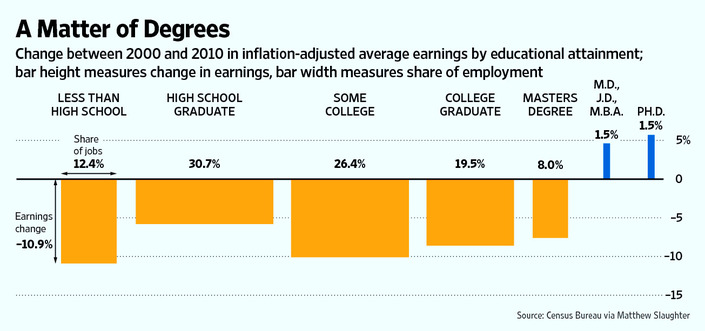It is frequently asserted that Americans are unemployed and have declining wages because they are undereducated, but that's very hard to square with these data from US Census Bureau (via Mathew Slaughter, via David Wessel at WSJ, via John Schmitt). In the first decade of the 21st Century, real wages of the 31% of the work force that have high school diplomas declined less than the 54% that have some college, bachelor's degrees, or even master's degrees. Only the 3% with Ph.D.s or professional degrees had real wage gains.

Schmitt's excellent point is that a decline in wages is strong evidence against the argument that there has been a shortage of workers with BAs and MAs. When there have been such shortages in the past, wage levels have risen, but not so in the 21st Century. As I've written before, we can't fix this by increasing the number of people that have higher education—in fact, adding to that existing oversupply will depress their wages further, which is the actual objective of some. Nor can we fix the problem by doubling or tripling the number of people who get Ph.D.s and professional degrees—there is no plausible prospect that all of them could find appropriate employment, and those wages would also be driven into decline by an oversupply.
We hear anecdotes about shortages of recent graduates from American colleges, to fill e.g. software development jobs, but we don't hear that employers are increasing the salary offerings for those positions in order to meet their hiring goals. Instead, US employers are using our lax immigration laws to fill the slots with Indians at wages that are high for India but depress US wage rates. That trend may be accelerated by young Americans avoiding vocations that appear highly exposed to foreign price competition and outsourcing. As I have pointed out, labor shortages in declining industries are to be expected.
There are many good reasons to be concerned about the state of American education and to strive to improve its quality and availability, but we should reject the unsupportable claim that unemployment and/or middle-class wage rates can be significantly improved in the short- or medium-term, or even in the long-term, by putting more people with better educations into the US work force. Our 21st Century problem is a shortage of jobs in America, not a shortage of qualified American workers, and we must find our solutions outside the educational system.
 Skeptic
Skeptic